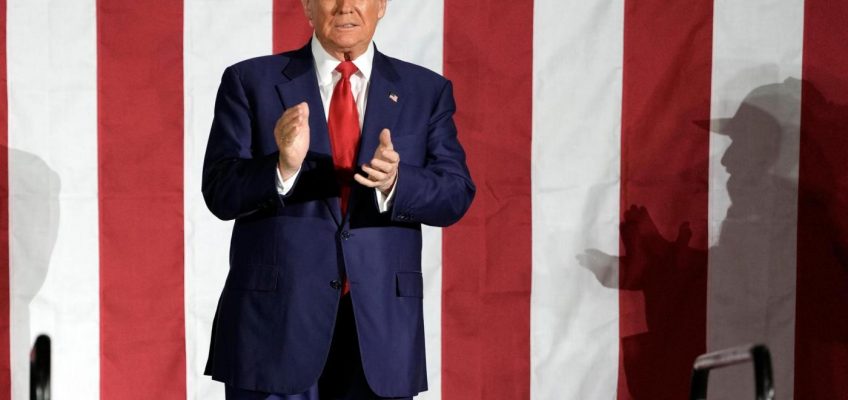A second Trump administration might be very different from the first, and that includes how the president treats the Fed. Donald Trump complained a lot about the U.S. Federal Reserve when he was president, jawboning for lower interest rates and questioning its competence. Yet at the end of the day the Fed retained its independence and credibility. Now all that is in danger.
Trump advisers have been drafting plans to limit significantly the operating autonomy of the Fed. The Trump campaign has disavowed these plans, but the general ideas have been spreading in Republican circles, as evidenced by the Heritage Foundation’s Project 2025 report. Trump himself has called for a weaker dollar policy, which could not be carried out without some degree of Fed cooperation. As a former businessman and real-estate developer, Trump seems to care most about interest rates, banking and currencies.
One concrete proposal reported in the Wall Street Journal would require the Fed to informally consult with the president on decisions concerning interest rates and other major aspects of monetary policy. That would make it harder for the central bank to commit to a stated policy of disinflation, since the ongoing influence of the president would be a wild card in the decision. Presidents would likely give more consideration to their own reelection prospects than to the advice of the Fed staff. Further confusion would result from the reality that the responsibility of the president in these matters simply would not be clear.
It’s important not to be naïve: Regardless of who is in the White House, the Fed already cares what the president and Congress think, as its future independence is never guaranteed. Still, explicit consultation would undercut the coherence of the decision-making process within the Fed itself and send a negative signal to investors. There is no upside from this approach.
It’s also true that there are countries where the government, not the central bank, steers monetary policy. In New Zealand, the government establishes an inflation target and the Reserve Bank of New Zealand is expected to meet it or explain why it failed. This way the legislature (which is closely allied with the executive branch, unlike in the U.S.) has to take responsibility for the inflation rate. Although this method has worked for New Zealand, it is impracticable for the U.S., due to the extreme separation of powers in the U.S. government. The new Republican proposals, in contrast to the Kiwi emphasis on clear lines of governance, seek behind-the-scenes influence without accountability for the executive branch.
If Trump wins, America’s best hope is that the administration itself reconsiders these plans and rejects them. (Congress could also force him to reconsider his Fed choices, as it did in his first term.) One reason the current semi-independent Fed is useful is that it allows the president — and, more important, Congress — to shift blame for tough monetary-policy decisions. House members, who face reelection every two years, benefit from this arrangement most of all. So if a Trump election is accompanied by a Republican House, a plausible but by no means certain outcome, the Republican Party itself may not want to restrict Fed independence. The whipping boy would be gone.
Another of the new proposals would subject the Fed to the executive-branch review process, much as other agencies must undergo, ostensibly to ensure that “the president’s policies and priorities are reflected in agency rules.” Does anyone think that today’s executive branch, operating from a great distance, would improve the Fed’s decisions on bank supervision? Of course if the president has ideas to improve bank supervision, he is free to introduce new legislation before Congress toward that end.
As it now stands, the Fed — because of its relative statutory and de facto independence — has a reputation for attracting superior talent, relative to many other parts of the federal government. Making it just another executive-branch agency would jeopardize that.
Conservatives are concerned, often justifiably, that many federal agencies are out of control, overregulating and exercising regulatory powers that Congress never truly delegated. But this argument does not apply to the Fed. To whatever extent banking may be overregulated, the problem is too many distinct regulators at multiple levels of government — not an excessively interventionist central bank.
And then there is perhaps the most important truth of all. The executive branch — subject to the caprice of Congress, of course — already has at its disposal a fairly direct means of restoring greater monetary and financial stability to the U.S.: the federal budget. If it were more fiscally responsible, then the Fed’s job would be much easier.
At the very least, the executive branch could draw up such a budget and fight for it. If the president — whether it’s Trump or not — did that, it would be proof that he is serious about monetary stability. Otherwise, it’s safe to assume that any plans for the Fed, however implausible, amount to just another clumsy power grab.
Tyler Cowen is a Bloomberg Opinion columnist, a professor of economics at George Mason University and host of the Marginal Revolution blog.
Related Articles
David French: Colleges have gone off the deep end. This is the way back.
Stephen L. Carter: Will Columbia protesters achieve their goals?
Thomas Friedman: Israel has a choice: Rafah or Riyadh
Bruce Yandle: Halt, they cried! But the inflation tide continues
Lisa Jarvis: Idaho’s abortion ban is based on legal delusion and medical myth


Leave a Reply